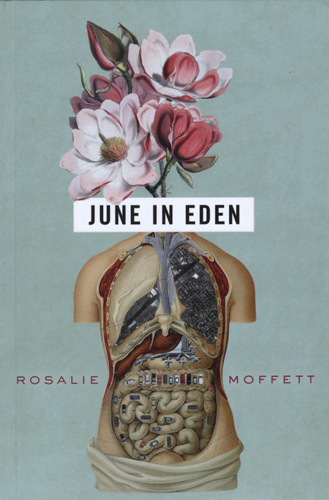June in Eden
Rosalie Moffett won The Journal Charles B. Wheeler Poetry Prize with her debut collection of poetry titled June in Eden. In this, her prize-winning book, Moffett shapes original ideas into poems that reflect her interest in family, science and technology. It’s dedicated to her mother and father, and they’re featured throughout.
Rosalie Moffett won The Journal Charles B. Wheeler Poetry Prize with her debut collection of poetry titled June in Eden. In this, her prize-winning book, Moffett shapes original ideas into poems that reflect her interest in family, science and technology. It’s dedicated to her mother and father, and they’re featured throughout.
I was especially drawn to the poem “How to Return,” which speaks of her mother, beginning when “[ . . . ] helmetless, my mother / unaware, was lifted or cradled or cars / she did not recall wove around her.” It continues: “Everyone evacuated while she waited / in the hospital, wondering what / was the word for that, again?” And ends with these exceptional thoughts from the daughter on how life will now change:
[ . . . ] Anyone can leave
through a door. I wish I’d known
to leave through a wall, breakingcartoon-like, a perfect body-
shaped hole. This is the only way,
isn’t it, to know how to return exactly
to the same place as the same, exact person.
According to Moffett’s poems, her mother suffered from a neurological condition called aphasia, which can refer to loss of speech or understanding of language due to brain damage. She alludes to this several times, as in “Noise” :
Words
though the aphasiac misses them are just
one piece. You cannot lie
the neurologist claims, to an aphasic: They are like dogs,
sensitive. The expression gives
it away.
Her mother appears again in “The Only Paradise,” which ends with these heartfelt words:
Memory is the only paradise from which we cannot be driven
it said on the cover of a blank photo album I found
it in myself to scoff at. Though that was later, when I knew
about her brain, how it looked—even the doctor said—like a city
at night with small, black power outages.
But what about her dad? There’s an interesting perspective in “The Family Lives on a Farm”: “The family is five: the girl, two boys, the mother, / and the father who sinks inevitably / to the bottom of the list.”
The family in the poem raises and sells peaches. It ends with these words:
the father becomes like a small black hole
in a chair at the table. The family leans toward it, they can’t
help it. The father is a clingstone, and each
of the children has a dark little peach pit
you might see if you split them open.
I found several references to twins in Moffett’s work. “This World, Its Weather” introduces the subject with “[ . . . ] For a time, / I was a twin. [ . . . ] Somewhere, I have a sister / circuit, wired in mirror image. All night I understand / the data to be hers.”
Later, in her self-titled poem “Rosalie Ruth Moffett,” she indulges in wordplay:
[ . . . ] they named me Ruth
which is a kind of compassionnobody wants anymore—the surviving half
of the pair of words is ruthless.
[ . . . ] I miss, I guess,the one who should have been Ruth, whose name
I stole and wore. I took a little of her
as collateral damage.
Continuing with the word and idea of “less,” though in a different direction, Moffett overlaps botany and technology in “A Certain Eden.”
I believe the landscaping
truck full of tree limbs
with the bumper sticker that says Trees don’t bleed
because I believe in limblessness—in the painless beauty of that
move toward cordless,
and then cell.
The connection appears again in “The New Trees” influenced by the lead-in, “Cell towers can be hidden inside an artificial tree.”
The new trees rise up and up, fingering out, one cell
in a cellular network. They do everything
the old trees did: listen, collect our discarded breath,transmit it new into air.
Finally, Moffett can’t ignore the cosmos, as she proves in “The Observable Universe”:
What a meager galaxy there is
in this vending machine cinnamon roll,
that metal spiral that turns to free it. Who knows
what else is out there.
It’s hoped that what else is out there is more of her poetry for readers to peruse and savor.





